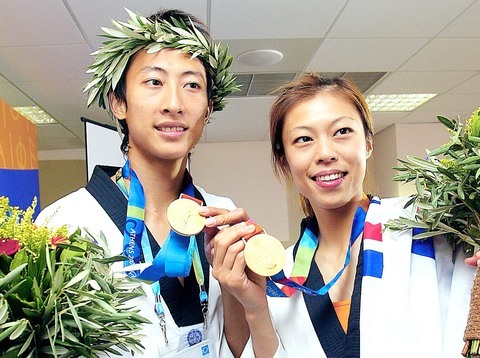For the first time ever, Taiwanese Olympic athletes struck gold when Chu Mu-yen (朱木炎) and Chen Shih-hsin (陳詩欣) won two gold medals in the lightweight taekwondo competition at 2004 Olympics Games in Athens, setting the whole country aflame with pride and joy.
On Aug. 26, Chen Shih-hsin, 25, defeated Cuba's Yanelis Yuliet Labrada Diaz in the final of the women's under-49kg division and won Taiwan's first-ever Olympic gold medal. Later that night, Chu Mu-yen, 22, won the gold in the men's under-58kg division by defeating Mexican Oscar Francisco Salazar Blanco.

PHOTO: LIAO CHEN-HUI, TAIPEI TIMES
It marked the first time that any country had won two gold medals on a single day in taekwondo since it became an Olympic event 12 years ago. The record-breaking victory turned the two young athletes into national heroes overnight.
Upon their homecoming, the two Olympic stars were welcomed back by a huge parade in Taipei on Sept. 1 and honored by President Chen Shui-bian (陳水扁) six days later. The country's first gold medalists also led fourteen fellow Olympic and Paralympic medalists in singing the national anthem with university students in Oct. 10 national day celebrations.
What won Chu and Chen great admiration was the struggle behind their now-realized stellar career. Chen Shih-hsin was 18 when she ran away from home and fled the harsh life of her taekwondo training center in Kaohsiung. To earn a living in Taichung, Chen gave up her dream to kick her way onto the world stage and became a roadside vendor selling clothes and betel nuts.
Chu had always been in the shadow of fellow competitor Huang Chih-hsiung (黃志雄) in the under 58kg category, which accentuated his status as a blooming talent. But in 2002, Chu grabbed a silver medal at the Asian Games in Sapporo and defeated South Korea's top taekwondo athlete in the World Student Games last year.

Three batches of banana sauce imported from the Philippines were intercepted at the border after they were found to contain the banned industrial dye Orange G, the Food and Drug Administration (FDA) said yesterday. From today through Sept. 2 next year, all seasoning sauces from the Philippines are to be subject to the FDA’s strictest border inspection, meaning 100 percent testing for illegal dyes before entry is allowed, it said in a statement. Orange G is an industrial coloring agent that is not permitted for food use in Taiwan or internationally, said Cheng Wei-chih (鄭維智), head of the FDA’s Northern Center for

The Chinese military has built landing bridge ships designed to expand its amphibious options for a potential assault on Taiwan, but their combat effectiveness is limited due to their high vulnerability, a defense expert said in an analysis published on Monday. Shen Ming-shih (沈明室), a research fellow at the Institute for National Defense and Security Research, said that the deployment of such vessels as part of the Chinese People’s Liberation Army (PLA) Navy’s East Sea Fleet signals a strong focus on Taiwan. However, the ships are highly vulnerable to precision strikes, which means they could be destroyed before they achieve their intended

About 4.2 million tourist arrivals were recorded in the first half of this year, a 10 percent increase from the same period last year, the Tourism Administration said yesterday. The growth continues to be consistent, with the fourth quarter of this year expected to be the peak in Taiwan, the agency said, adding that it plans to promote Taiwan overseas via partnerships and major events. From January to June, 9.14 million international departures were recorded from Taiwan, an 11 percent increase from the same period last year, with 3.3 million headed for Japan, 1.52 million for China and 832,962 to South Korea,

REWRITING HISTORY: China has been advocating a ‘correct’ interpretation of the victory over Japan that brings the CCP’s contributions to the forefront, an expert said An elderly Chinese war veteran’s shin still bears the mark of a bullet wound he sustained when fighting the Japanese as a teenager, a year before the end of World War II. Eighty years on, Li Jinshui’s scar remains as testimony to the bravery of Chinese troops in a conflict that killed millions of their people. However, the story behind China’s overthrow of the brutal Japanese occupation is deeply contested. Historians broadly agree that credit for victory lies primarily with the Chinese Nationalist Party (KMT)-led Republic of China (ROC) Army. Its leader, Chiang Kai-shek (蔣介石), fled to Taiwan in 1949 after losing a